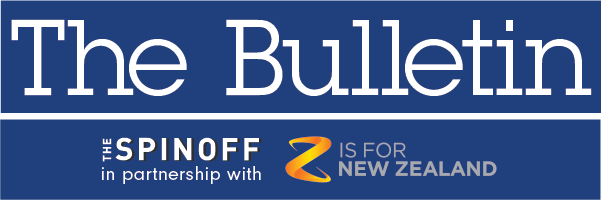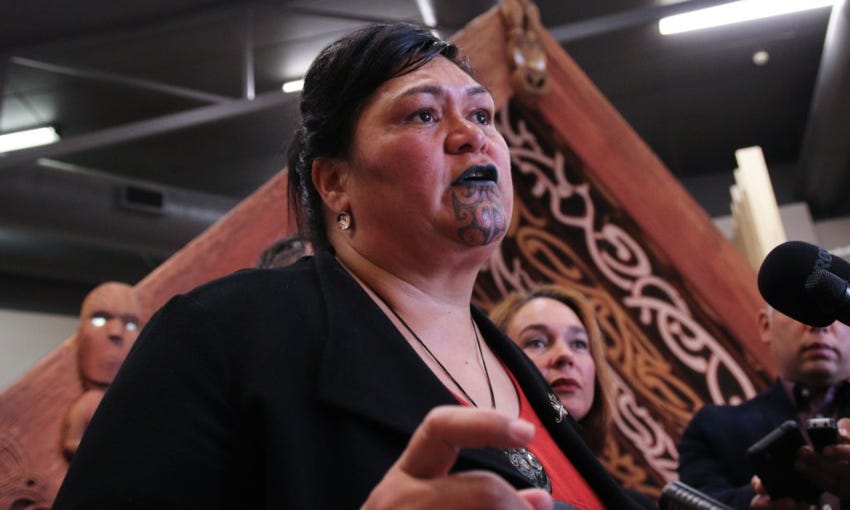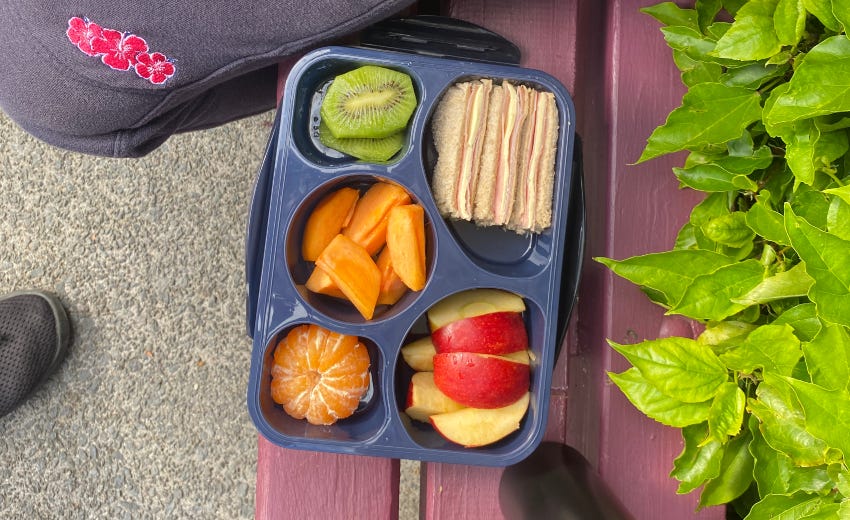Advice to shape water reforms released
The price tag of action is enormous. The price tag of inaction is even bigger
Good morning and welcome to The Bulletin for Thursday 3 June, by Alex Braae for The Spinoff. Presented in partnership with Z Energy.
In today’s edition: Advice to shape water reforms released, former National candidate faces serious allegations, and body cameras could soon be coming to a police officer near you.
Image: Local government minister Nanaia Mahuta (Getty Images)
Hundreds of pages of advice to local government minister Nanaia Mahuta on the upcoming water reforms has been released, and it shows a spending bomb about to drop. Stuff's Thomas Coughlan has a report on the key points of the advice, and the timeline with which the government intends to act. The costs attached to saving the country's water infrastructure are immense – anywhere from $120-185bn over 30 years. The programme also proposes to slash the number of organisations that oversee water infrastructure, from the current mass of councils down to 1-4. Coughlan tweeted some of the geographical splits that have been suggested in the advice, and to my eyes they look like the sort of maps you'd draw if you wanted just one water organisation – similar to how the government has reformed the health and polytech sector. If you're interested, the reports in full can be read here.
The ownership of however many entities get created will be a sticking point. Newsroom's Jonathan Milne looked into that ahead of the advice coming out, and reported that Auckland mayor Phil Goff was unhappy with several aspects. He (and a fair few other councils) are concerned about any entity that could theoretically be privatised, and that he's not sure if it's fair Auckland ratepayers should subsidise areas that haven't been able to keep up with infrastructure demands. Milne reports that under the advice, the entities "will be publicly-owned, but it's not yet clear what that will look like."
What could the reforms mean for the cost of water in daily life? For context, that's a cost that is probably going to go up regardless. Justin Giovannetti wrote in our live updates that without the reforms, the average annual household bill is projected to reach $13k within 30 years. All sorts of places are going to see these sorts of cost increases – for example, LDR reporter Lois Williams recently covered the four-fold service costs the residents of Inangahua Junction are about to be hit with. So big picture, the government's view is that those sorts of costs can be made a lot more manageable with centralisation, along with providing more expert oversight of the assets. Whether they can make that case to nervous councils is another matter altogether.
Former National candidate Jake Bezzant has been the subject of some very serious allegations about his conduct in a recently-ended relationship. I can't really outline the details because of email filters, but the allegations are covered in this Newshub story, which added Bezzant's comments to statements originally made by his ex-partner on this podcast. Bezzant stood in the seat of Upper Harbour in 2020, losing it despite the retiring Paula Bennett holding a 9,000 vote majority. Bezzant was also the subject of this Business Desk story last year, in which he was accused of pumping up his CV and over-inflating his business background. He resigned his party membership earlier this week.
Body cameras could be coming soon to a police officer near you. That's because there has been an interesting convergence of opinion on the topic – first police commissioner Meng Foon made a call in the NZ Herald for the technology to be adopted, and then the Police Association gave support to the idea, with boss Chris Cahill saying "we don't think there is anything to be feared." It could be something of a win/win – if an officer is racist or abusive, that will be captured on camera, and if an officer is unfairly smeared that'll be captured too.
A paid message from our partners at the Infrastructure Commission: Plan. Design. Fund. Deliver. On paper it seems pretty simple, but for our infrastructure to be truly future-proofed, first we need to know that we're trying to move in the right direction. The New Zealand Infrastructure Commission is seeking submissions now for a 30-year infrastructure strategy – if you've got thoughts on the direction we should be taking, click here to have your say.
Refining NZ, which refines oil at Marsden Point, is moving closer to closing down, with petrol to be imported instead. The decision is economic, with other refineries overseas operating more efficiently. But there are some potentially big implications of it all. The first story on this comes from (paywalled) Business Desk, and covers the government's various considerations around what this could mean for fuel security. Supply chains have after all been heavily disrupted over the last year, though fuel hasn't been badly affected. The other consideration is the loss of jobs – Radio NZ reports workers at the refinery are worried about mass redundancies, which would hit hard in Northland, where unemployment is already higher than the national average.
Across the Tasman, Melbourne's lockdown has been extended for another week. The ABC reports the outbreak has now grown to 60 cases, and what's a bit more concerning is that "at least one in 10 current cases" had caught the virus in "casual contact settings", according to Victoria's chief health officer. A family who subsequently tested positive travelled to New South Wales, reports 9News, sparking fears that they were infectious while there.
In Sāmoa, the Court of Appeal has given a somewhat complicated verdict in a crucial case that could decide who takes power. RNZ Pacific reports the court upheld the idea that there should be six women MPs, to meet a 10% gender quota – however that should only be put in place after all the electoral petitions have been heard, and any subsequent byelection take place. If the composition of parliament was to stay exactly the same after all of that, then it looks likely parliament would end up back in a 26-26 deadlock.
Some big news for the whole company: We're officially introducing Daylight Creative, a new content studio that'll function as the commercial arm of The Spinoff. In this piece Duncan Greive explains the work it'll do, and why it's a natural and necessary evolution of The Spinoff. And working in the same building as this lot (albeit in a different room) I can safely say they're a very good bunch to work with.
Got some feedback about The Bulletin, or anything in the news?
Drop us a line at thebulletin@thespinoff.co.nz
Right now on The Spinoff: Justin Latif reports on the views various South Auckland principals have about the free school lunch programme. Andrew Geddis writes about why term limits for MPs might not be such a great idea after all. Bernard Hickey looks at the housing bubble, and why we've stopped believing the forecasts of politicians and institutions. Paul Hunt and Meng Foon write about why there's nothing to fear from He Puapua. Michael Andrew looks at a group of local tech startups that have been snapped up by bigger players for big money. Hal Crawford speaks to the person behind a new search engine that'll operate without invasive and creepy ads, but ask users to pay instead. Journalist and media trainer Venetia Sherson writes about Naomi Osaka and the demands of media. And Jonique Purcell meets Ladyhawke, who after many years away is on the verge of releasing a new album.
For a feature today, an analysis of a story that has dominated the sport and media world this week. Tennis star Naomi Osaka decided to withdraw from the French Open rather than doing press conferences, in a move which she attributed to protecting mental health. On the ever-thoughtful Sportsfreak blog, Harbour Heather has unpacked why this is an entirely reasonable thing to do – but also why it can't become the norm. Here's an excerpt:
It’s true that the media can give athletes a platform. Osaka herself chose to use it to elevate the names of Black Americans killed by police on her masks worn during the 2020 US Open. But it’s also true that not everyone was made for it. To paraphrase Shakespeare, some are born for the media, and some have media thrust upon them. Give Kane Williamson the option not to do press conferences and I’m sure he’d take his surfboard and run with it.
It’s true that not every athlete would be in the position to say “I’m not doing press” and take the hit of a hefty fine, or have the ability to pull out of a tournament, because they might be relying on that appearance money to keep the lights on at home. While she’s coming from a position of financial security, it’s also true that intersectionality is at play for Osaka. As a female of colour, extra lenses are applied to everything she does, on and off the court, as much as we may wish that weren’t the case. And she’s young, so young. Remember, this is an athlete who had to endure boos from a crowd after her first grand slam win, and then apologised to them for winning. Some introduction to the spotlight.
It turns out Devon Conway can bat a bit. The Black Caps debutant finished the first day of the test against England not out on 136, leading the team to a highly credible 246-3 at stumps. In doing so, the NZ Herald reports he set a new record for debutants playing at Lord's. And if you want to listen to something about cricket on the way into work, we've got a brand new episode of The Offspin, in which we talked about life with Kit Perera, a hugely influential local cricket coach whose life has been shaped by the game he loves.
That's it for The Bulletin. If you want to support the work we do at The Spinoff, please check out our membership programme.







